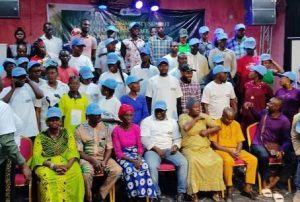The Local Community Summit on Oil Divestment and Environmental Justice that held in Agbarho local community in Delta State on Thursday, February 8, 2024, brought together stakeholders from oil polluted communities in the Niger Delta region. It was themed: “Strengthening Indigenous Knowledge to Bridge Climate Action gaps in transiting from fossil-fuels”.

The event declared open by the convener and Executive Director of Connected Advocacy, Prince Israel Orekha, who welcomed all the participants and emphasised the imperatives of the event, underlining why the issue of local community oil divestment and environmental justice must take the centre stage of discussions.
“We are the people that bear the brunt of the impact on environmental degradation and climate crisis,” he said, adding that transitioning from fossil fuels and strengthening indigenous knowledge to bridge climate action gaps is urgently needed.
He noted that against the backdrop of the recently held COP28 conference in Dubai, there is need to ensure that local community voices are heard in oil divestment and environmental justice, due to the constant neglect of local community issues at COPs, and other regional meetings.
He added that the devastating condition of the environment underscores the urgent need for action, particularly in regions like the Niger Delta, where communities bear the disproportionate burden of climate change impacts.
“Looking at the International Oil Companies (IOCs) divestment without visible decommissioning plans in to pay compensations, our community will be left with stranded assets, stranded personnels and a stranded community, the need for environmental accountability is imperative. We hope we can find ways to work together to create a more sustainable future for our planet,” Orekha stressed.
A speaker, Babawale Obayanju, delved into the indigenous beliefs and practices of the people to establish a ground for environmental justice, while another speaker, Umfon Gabriel, shed some light on the IOCs divestment saga going on in Nigeria, why it’s unethical and how we can hold the polluters accountable. One of his overarching solutions was beneficial ownership disclosure.
Women aired their deepest concerns of pollution and complained about the scarcity of matured fishes. They also expressed worry about the future of their children and poor agricultural yield.
Connecting the reality of Agbaho people to climate action, Obayanju emphasised action, need to identify their challenges, their implications and how they can collectively address things.
Gabriel stated: “In order to hold IOCs accountable, we must understand the legal framework underlying the whole process,” even as he revealed the limitation of the people in demanding for justice.
He told the audience that they possess the right to demand for documentations and profiles of IOCs deals and their major stakeholders and beneficiaries.
“Knowing the beneficiaries, understanding the terms and conditions of the contracts etc would give the people an edge in demanding justice,” he noted, emphasising youth empowerment and policy advocacy.
“The destiny of the people lies in their ability to act,” he stressed.
